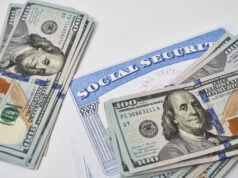
For most Americans, inflation and rising interest rates are a one-two punch.
On the heels of another rate hike this week by the Federal Reserve, credit card annual percentage rates are already near 20%, on average, and set to climb even higher. At the same time, more consumers are leaning on credit to afford increasingly expensive necessities, like food and rent.
The average balance rose to $5,805 over that same period, TransUnion found.
At nearly 20%, if you made minimum payments toward this average credit card balance, it would take you more than 17 years to pay off the debt and cost you more than $8,213 in interest, Bankrate calculated.
 “Whether it’s shopping for a new car or buying eggs in the grocery store, consumers continue to be impacted in ways big and small by both high inflation and the interest rate hikes implemented by the Federal Reserve,” said Michele Raneri, vice president of U.S. research and consulting at TransUnion.
“Whether it’s shopping for a new car or buying eggs in the grocery store, consumers continue to be impacted in ways big and small by both high inflation and the interest rate hikes implemented by the Federal Reserve,” said Michele Raneri, vice president of U.S. research and consulting at TransUnion.
Overall, an additional 202 million new credit accounts were opened in the fourth quarter, led by originations among Generation Z, or adults ages 18 to 25, and the tally of total credit cards hit a record 518.4 million.
As the number of credit card accounts in the U.S. rises, more new customers are subprime borrowers, generally meaning those with a credit score of 600 or below, according to TransUnion, in part because of the flood of younger borrowers gaining access to credit cards.
But at the same time, delinquencies rose as lenders expand access to less-experienced credit users, the report found. TransUnion defines a delinquency as a payment that’s 60 days or more overdue.
“The increase in delinquencies is something to watch,” Raneri said. As long as unemployment stays down, households are better able to pay their bills, she noted. “If unemployment goes up, and we see a spike in delinquencies, then that indicates a longer-term problem.”
For now, the unemployment rate is at a 53-year low, after a better-than-expected January jobs report.
How to tackle high-interest credit card debt
“Cardholders do have options, though,” said Matt Schulz, chief credit analyst at LendingTree. Zero percent balance transfer credit card offers are even more plentiful than they were a year ago and remain one of the best weapons Americans have in the battle against credit card debt, he said.
Borrowers may also be able to refinance into a lower-interest personal loan. Those rates have climbed recently, as well, but at 10%, on average, are still well below what you currently have on your credit card, according to Schulz.
Otherwise, go back to the basics, advised Ted Rossman, a senior industry analyst at Bankrate.
“Take on a side hustle, sell stuff you don’t need, cut your expenses,” he said. “A dollar saved is a dollar earned, and every dollar of credit card debt that you pay down has an average guaranteed, tax-free return of about 20%.”
Disclaimer
Artificial Intelligence Disclosure & Legal Disclaimer
AI Content Policy.
To provide our readers with timely and comprehensive coverage, South Florida Reporter uses artificial intelligence (AI) to assist in producing certain articles and visual content.
Articles: AI may be used to assist in research, structural drafting, or data analysis. All AI-assisted text is reviewed and edited by our team to ensure accuracy and adherence to our editorial standards.
Images: Any imagery generated or significantly altered by AI is clearly marked with a disclaimer or watermark to distinguish it from traditional photography or editorial illustrations.
General Disclaimer
The information contained in South Florida Reporter is for general information purposes only.
South Florida Reporter assumes no responsibility for errors or omissions in the contents of the Service. In no event shall South Florida Reporter be liable for any special, direct, indirect, consequential, or incidental damages or any damages whatsoever, whether in an action of contract, negligence or other tort, arising out of or in connection with the use of the Service or the contents of the Service.
The Company reserves the right to make additions, deletions, or modifications to the contents of the Service at any time without prior notice. The Company does not warrant that the Service is free of viruses or other harmful components.












